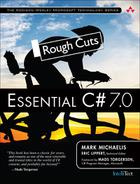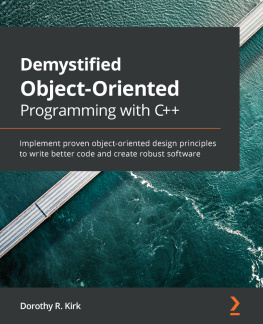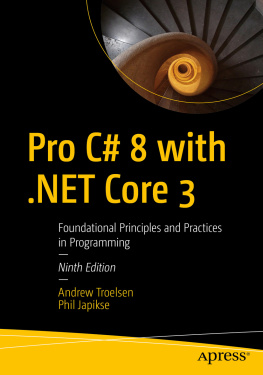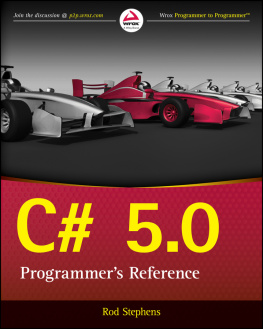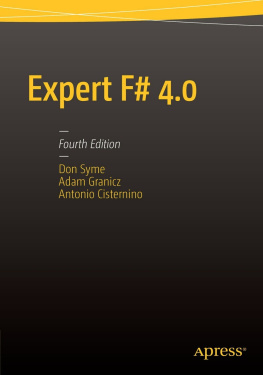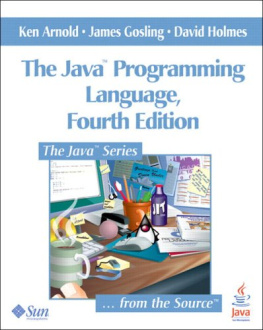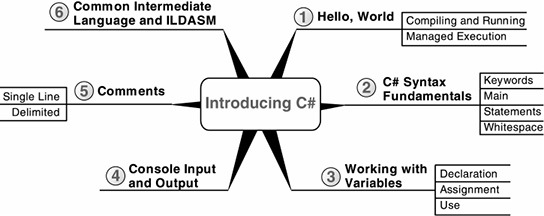Mark Michaelis - Essential C# 7.0
Here you can read online Mark Michaelis - Essential C# 7.0 full text of the book (entire story) in english for free. Download pdf and epub, get meaning, cover and reviews about this ebook. year: 2018, publisher: Addison-Wesley Professional, genre: Computer. Description of the work, (preface) as well as reviews are available. Best literature library LitArk.com created for fans of good reading and offers a wide selection of genres:
Romance novel
Science fiction
Adventure
Detective
Science
History
Home and family
Prose
Art
Politics
Computer
Non-fiction
Religion
Business
Children
Humor
Choose a favorite category and find really read worthwhile books. Enjoy immersion in the world of imagination, feel the emotions of the characters or learn something new for yourself, make an fascinating discovery.
- Book:Essential C# 7.0
- Author:
- Publisher:Addison-Wesley Professional
- Genre:
- Year:2018
- Rating:3 / 5
- Favourites:Add to favourites
- Your mark:
Essential C# 7.0: summary, description and annotation
We offer to read an annotation, description, summary or preface (depends on what the author of the book "Essential C# 7.0" wrote himself). If you haven't found the necessary information about the book — write in the comments, we will try to find it.
The Comprehensive, Expert Guide to the C# 7.0 Language and Programming Paradigms
This book has been a classic for years, and remains one of the most venerable and trusted titles in the world of C# content, and probably far beyond! Mads Torgersen, C# Program Manager, Microsoft
Essential C# 7.0 is a well-organized, no-fluff guide to C# 7.0 for programmers at all levels of experience. Reflecting C# 7.0 features and modern programming patterns, it will help you write code thats simple, powerful, robust, secure, and maintainable.
Author Mark Michaelis is a world-class C# expert: a long-time Microsoft MVP and Regional Director who also serves on Microsofts C# design review team. He presents a comprehensive tutorial and reference for the entire language, including expert coverage of key C# 7.0 enhancements, C# 7.0s use with .NET Core/.NET Standard, and cross-platform compilation. He illustrates key C# 7.0 constructs with succinct examples, and presents best-practice coding guidelines. To help you maintain existing code, separate indexes provide version-specific answers for C# 4.0, 5.0, 6.0, and 7.0, and visual icons show when each language innovation was introduced.
- Make the most of C# 7.0 enhancements, including tuples, deconstructors, pattern matching, local functions, and ref returns
- Work efficiently with C# data types, operators, control flow, methods, and parameters
- Write more robust code with C# object-oriented constructs
- Implement reliable, effective exception handling
- Reduce code complexity with generics, delegates, lambda expressions, and events
- Leverage advanced dynamic and declarative programming techniques
- Query diverse data collections using LINQ with query expressions
- Create custom collections that operate against business objects
- Access .NET collections via collection interfaces and standard query operators
- Master multithreading and synchronization, including the async/await paradigm
- Optimize performance and interoperability with P/Invoke and unsafe code
- Run your code on Linux or macOS with C# 7.0 cross-platform compilation
This guide offers you a complete foundation for successful development with modern versions of the C# language in any project or environment.
Register your product at informit.com/register for convenient access to downloads, updates, and/or corrections as they become available.
Mark Michaelis: author's other books
Who wrote Essential C# 7.0? Find out the surname, the name of the author of the book and a list of all author's works by series.

